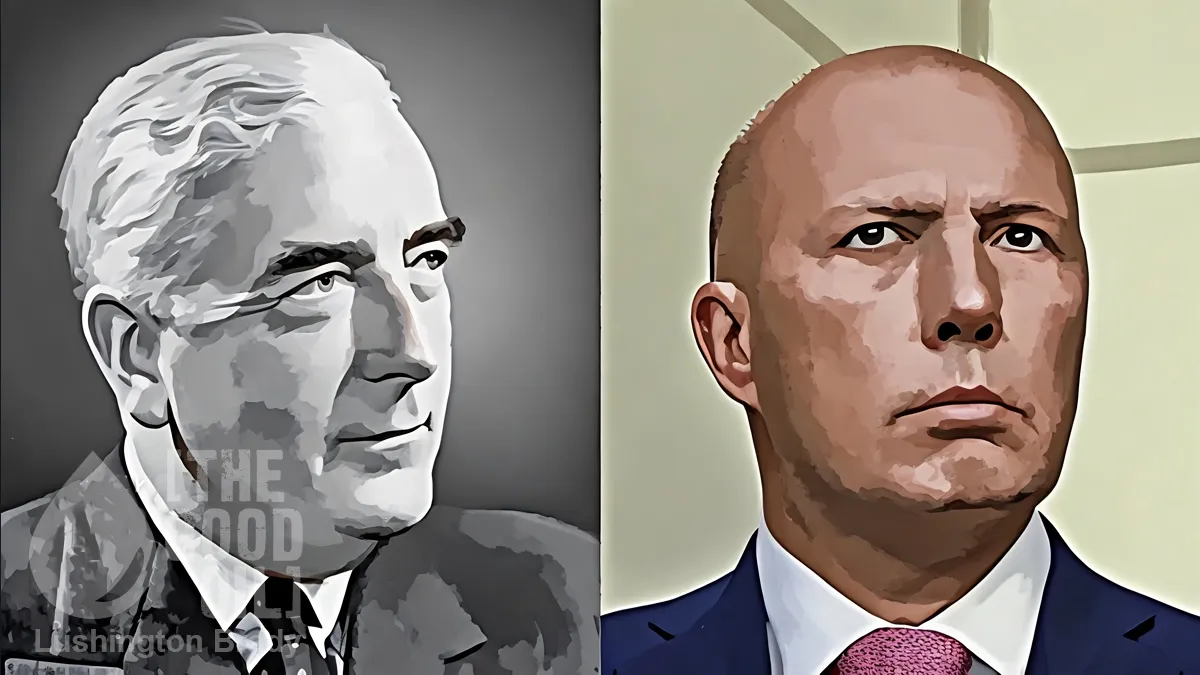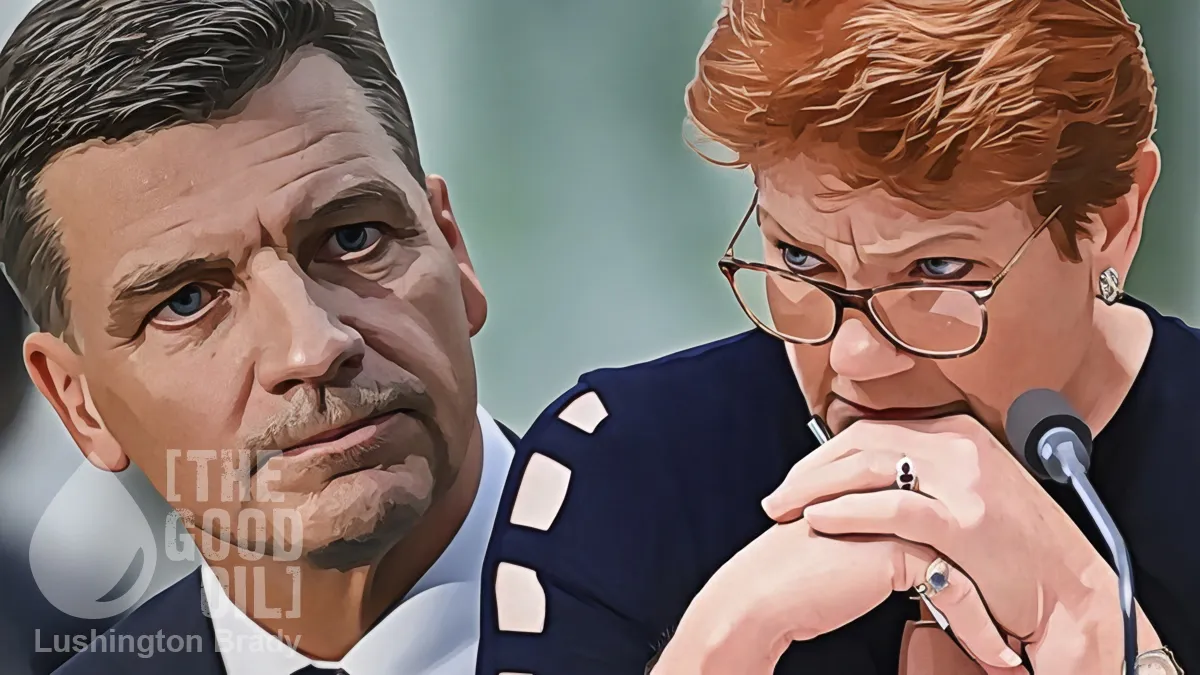Table of Contents
Like democracies the world over, Australia has been plagued by the same disease: the rise of an effective uniparty elite establishment. With both government and opposition united behind the same globalist, elitist, agenda, elections have become little more than a game of musical chairs. On the big issues – immigration, taxation, energy and so on – the major parties furiously agree with one another and nothing changes at election time except the phony grinning mug on the official stationery.
The only choice voters have is the colour of the ties on the suits lying to them.
Conservative voters have less choice than any: Labor, Greens, or Greens in more expensive suits. In the US, they’re called ‘RINOs’ (‘Republicans in Name Only). In Australia, they’re called ‘LINOs’ (‘Liberals in Name Only’) or ‘Laborals’. In New Zealand, they’re called ‘National’.
It often puzzles outsiders that Australia’s conservative party is called the Liberals. But that’s only because of the common modern error, mostly imported from the USA, of calling left-wing authoritarianism ‘liberalism’. But when the Liberal Party was founded, in opposition to the socialist Labor Party, it was named for true liberalism: emphasising the rights of the individual to free speech, free minds and free markets.
In 1942, the founder of the Liberal Party, then-opposition leader Robert Menzies, delivered a speech that remains epochal in Australian politics. Menzies laid out a manifesto for a post-war Australia that was free and prosperous. It is known as the ‘Forgotten People’ speech:
The salary-earners, shopkeepers, skilled artisans, professional men and women, farmers and so on. These are, in the political and economic sense, the middle class...
I do not believe that the real life of this nation is to be found either in great luxury hotels and the petty gossip of so-called fashionable suburbs, or in the officialdom of the organised masses. It is to be found in the homes of people who are nameless and unadvertised, and who, whatever their individual religious conviction or dogma, see in their children their greatest contribution to the immortality of their race.
The home is the foundation of sanity and sobriety; it is the indispensable condition of continuity; its health determines the health of society as a whole. – Robert Menzies.
Eighty years later, Menzies’ middle class has been forgotten again, not least by the very party supposed to represent them. The Liberals’ Peter Dutton is keen to drag the party back to that centre. Dutton has used a by-election campaign speech on the weekend to lay out a bold agenda for the 2025 federal election.
Dutton’s weekend speech had two obvious immediate purposes. Firstly, Dutton is out to sell his leadership as a repudiation of the Turnbull and Morrison years, where the so-called ‘moderates’ ruled a party that too-often became indistinguishable from Labor and the Greens and dubbed ‘Laborals’ by disenchanted voters.
Dutton is also clearly hoping to surf the wave of ‘Trumpian’ revolt against the left-establishment, declaring that this year’s election was the ‘last chance’ to arrest Australia’s economic and social decline. To that end Dutton has unveiled a raft of policy platforms, from energy to Australia Day and Israel, designed to provide a clear alternative to Labor and the Greens.
His speech contained clear references to Menzies’ era-defining speech: that the family is the most important unit in society and that business and industries, not governments, are the main source of enterprise and wealth creation. The role of government is not to nanny-state or micromanage citizens’ lives, but to concentrate on the big things – the economy and national security – and stand back and let the ordinary people run their own lives as they see fit.
“Australians are best served by smaller government which gets off their back, supports free enterprise, and rips up regulation,” he said.
To that end, Dutton says that, in government, he will lower taxes, protect superannuation, assist small business, unwind industrial relations laws that punish casual workers, restrain trade union excesses, address immigration and its impact on housing and sort out the growing energy mess.
Immigration is the white-hot button of this election, as it has been in democracies across the world, from the USA to Britain and Europe. The rise of the so-called ‘far right’ is being fuelled by one thing: incandescent rage at governments of elites who’ve flooded Western nations with the detritus of the Third World and used the dogma of multiculturalism to dismantle a thousand years of Western civilisation.
For Australian voters, nearly every important issue is downstream from immigration. Social cohesion, collapsing infrastructure and, more than anything else, a housing crisis unlike anything seen in previous generations.
The other big issue of the election is energy. Labor and the Greens are obsessed with a ‘Net Zero’ agenda that has delivered nothing but energy shortages at critical times and spiralling household electricity bills that are among the highest in the world. Many Australians are looking abroad to the UK and Germany and seeing their future in just a few years if nothing is done to arrest the descent into madness.
To that end Dutton has boldly placed nuclear energy – long a taboo in Australian politics – at the centre of Australia’s energy future. But nuclear is not the only tool in the Liberals’ box: expediting gas development, cutting green tape and halving approval times for resources projects are also in the mix. But the unhinged ferocity of the reaction from Labor and the Greens suggests that they are well aware that embracing nuclear is a game-changer. Opinion polls are also on the opposition leader’s side: distrust of nuclear is diminishing, and while equal numbers of Australians are decided for or against, there is a massive undecided group who are open to persuasion.
On education, Dutton is promising a back-to-basics approach, stripping out decades of left-wing ‘educational theory’ that’s delivered nothing but collapsing international rankings for Australian students.
Dutton is staking out another clear point of difference on perhaps the most serious social issue that Labor have let tear this country apart: anti-Semitism. Anthony Albanese has been missing in action while vile and open anti-Semitism grows bolder by the day, leading to undeniable terror attacks on Jewish homes and houses of worship. Albanese’s political ally Foreign Minister Penny Wong is openly hostile to Israel. Labor have emboldened the anti-Semitic dregs, all in the hopes of hanging on to a few votes in Muslim-dominated Western Sydney.
“Every incident of anti-Semitism can be traced back to the Prime Minister’s dereliction of leadership in response to the sordid events on the steps of the Sydney Opera House,” Mr Dutton said. “Anti-Semitism should have been stopped there and then. This government is so morally confused it treats our ally, Israel, like an adversary.
“Moreover, its push for Palestinian statehood at this time would reward Hamas’s use of terrorism to achieve political ends.”
Another social issue that has the quiet Australians quietly fuming is the unrelenting left-wing attacks on Australia Day and, by extension, the very legitimacy of the Australian state. Just how angry Australians are about this can be gauged by the massive public backlash when supermarket chain Woolworths (i.e., Countdown) announced last year that it wouldn’t be stocking Australia Day merchandise, to avoid ‘offense’.
Well, Australians were offended, all right. So much so that Woolworths has publicly and loudly reversed its policy this year. Leading the backlash was Peter Dutton. Dutton is going further, promising to reverse Albanese Government policy and once again require local councils to hold citizenship ceremonies on Australia Day. Dominated by wokesters, local councils used Labor’s policy as an excuse to move citizenship ceremonies to other dates. Albanese, says Dutton, signalled to councils that the date “didn’t matter” and was “something to be ashamed of.”
“I believe we live in the greatest country in the world. I’m incredibly proud of Australians and who we are. I’m proud of our indigenous heritage. I’m very proud of our migrant story, and I’m very proud of the fact that we are a country that should stand up and protect and defend its values,” Mr Dutton said.
Dutton says an elected Liberal Government would reinstate the former policy that councils who refuse to hold citizenship ceremonies on Australia Day will be stripped of the right to host such events.
“Would we reinstate the requirement for councils to hold citizenship ceremonies on Australia Day? You bet it’ll be done in the first 100 days and it will be a sign of pride and nationalism in our country,” he said.
“So the prime minister sent a signal to those councils that Australia Day didn’t matter, but that’s exactly what it did,” Mr Dutton said.
“I want us as a population to be united. I want us not to be divided, but I want us to stand up for what we believe in.” – Peter Dutton.
To top it all off, Dutton even challenged Albanese on his tiresome ‘I grew up in a council flat’ shtick.
Peter Dutton likewise grew up in humble circumstances, the son of a childcare worker and a builder. From there, though, his life experience couldn’t be more different to the prime minister. Anthony Albanese is a product of university student politics who only ever worked for one year as a bank officer before hitching his wagon to the Labor machine.
By contrast, while Anthony Albanese spent his youth backpacking and spouting Marxist dogma, the young Peter Dutton delivered newspapers, mowed lawns and worked in a butcher’s shop after school and on Saturdays and bought his first home at 19. As an adult, he ran a small business with 40 employees and was a copper for nine years. As a policemen, he spent a decade investigating organised crime, drug trafficking and sex offenders. These experiences, he says, sharpened his concern for the protection of women and families.
Most importantly, he says, he understands the Forgotten People in a way that ‘I grew up poor in a council flat’ Anthony Albanese just does not.
“From grade seven through to university, I threw newspapers, had a lawn mowing run and worked in a butcher’s shop after school and on Saturdays,” Mr Dutton said.
“I saved diligently to afford a house deposit. Buying my first home aged 19 was one of my proudest achievements.
“In that butcher’s shop job – and in my Dad’s building business – I saw the hard work required to run a small business.”
Anthony Albanese, by contrast, only ever learned how to rise to the top in left-wing politics.
In a conscious echo of Donald Trump’s campaign, Dutton says the next election is a ‘sliding doors’ moment for Australia. We can keep going on the ruinous path we’re on or try something that’s old enough to be new again: genuine liberalism.









